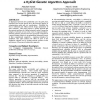Free Online Productivity Tools
i2Speak
i2Symbol
i2OCR
iTex2Img
iWeb2Print
iWeb2Shot
i2Type
iPdf2Split
iPdf2Merge
i2Bopomofo
i2Arabic
i2Style
i2Image
i2PDF
iLatex2Rtf
Sci2ools
GECCO
2005
Springer
2005
Springer
Designing resilient networks using a hybrid genetic algorithm approach
As high-speed networks have proliferated across the globe, their topologies have become sparser due to the increased capacity of communication media and cost considerations. Reliability has been a traditional goal within network design optimization of sparse networks. This paper proposes a genetic approach that uses network resilience as a design criterion in order to ensure the integrity of network services in the event of component failures. Network resilience measures have been previously overlooked as a network design objective in an optimization framework because of their computational complexity – requiring estimation by simulation. This paper analyzes the effect of noise in the simulation estimator used to evaluate network resilience on the performance of the proposed optimization approach. Categories and Subject Descriptors C.2.1 [Computer Communication Networks]: Network Architecture and Design- Network Topology. General Terms Algorithms, Design, Reliability, Experimentatio...
Related Content
| Added | 27 Jun 2010 |
| Updated | 27 Jun 2010 |
| Type | Conference |
| Year | 2005 |
| Where | GECCO |
| Authors | Abdullah Konak, Alice E. Smith |
Comments (0)

